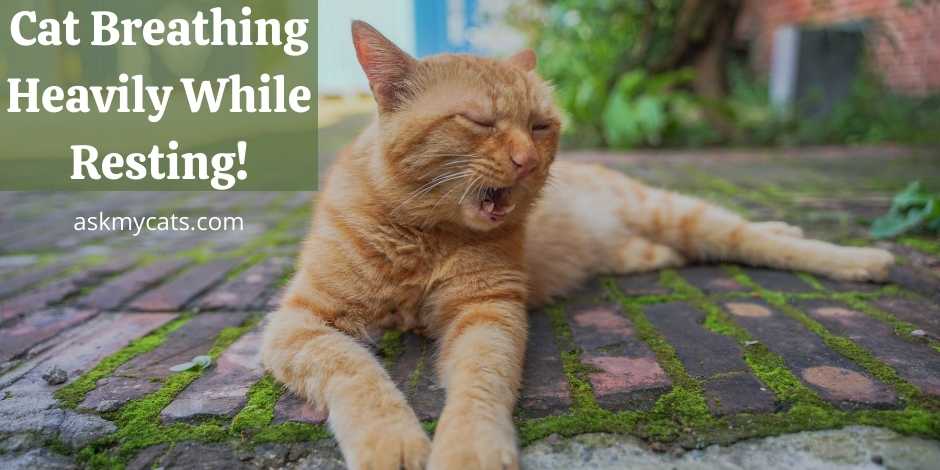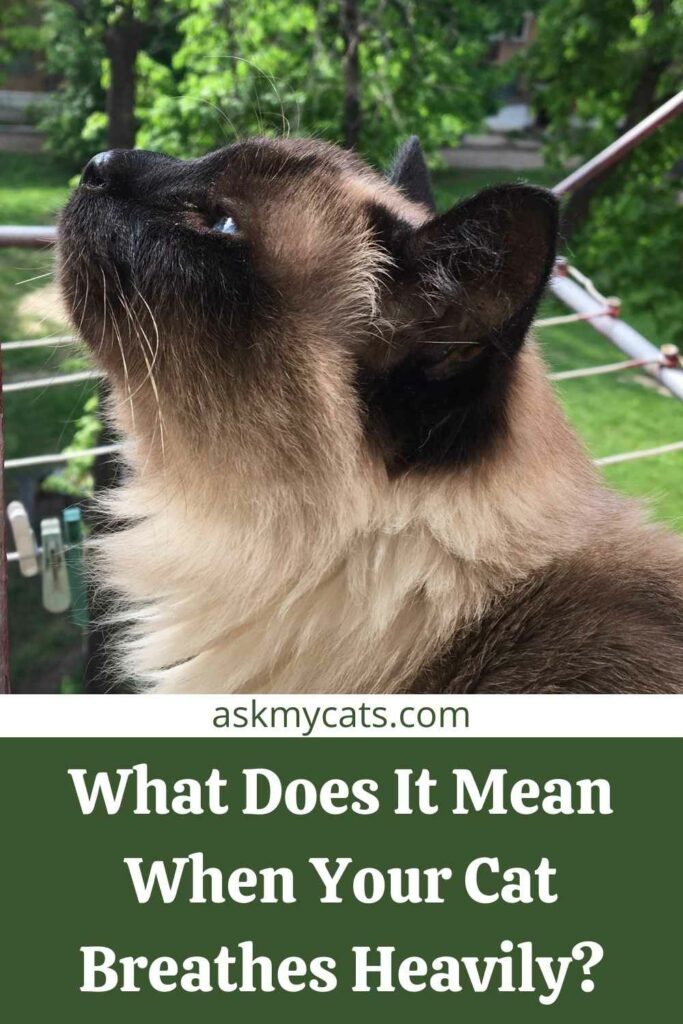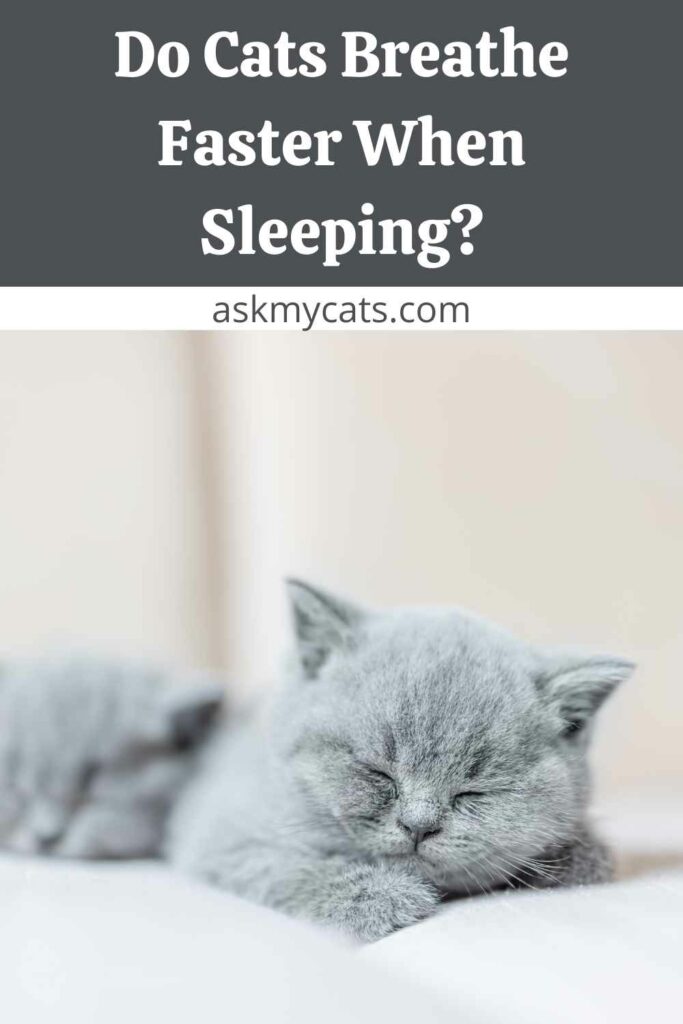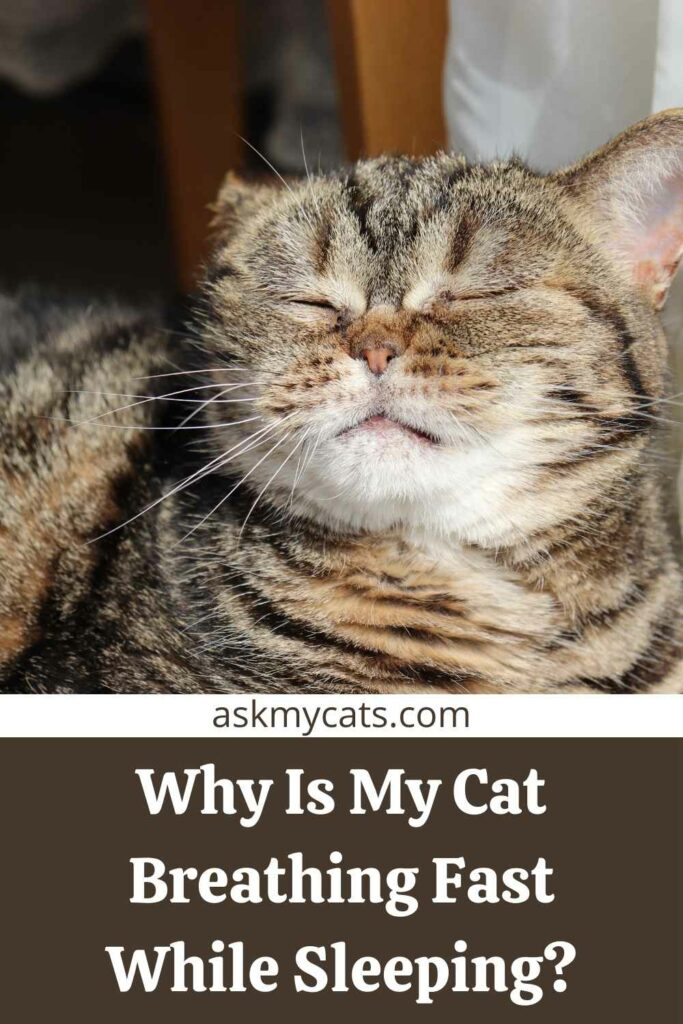Have you ever observed your sleeping cat breathing rapidly? If your cat is having trouble breathing, it might indicate anything from stress to heart problems.
Cats are notoriously elusive when revealing indications of sickness to their owners, so cat owners must be extra cautious in spotting symptoms like fast breathing.
Cats have a consistent breathing rate of 15-30 breaths per minute. Due to heart illness, a respiratory infection, asthma, injury, trauma, or a windpipe blockage, cats may breathe rapidly when resting.
On the other hand, rapid breathing isn’t necessarily indicative of a medical problem. Stressed cats, heat exhaustion, and over-exertion cause them to breathe quicker as they cool down and prepare to sleep.
Counting your cat’s breaths might help you figure out whether they are breathing quickly, but there are a few additional symptoms to look for over time.


Give Your Cat the Perfect Day
Get the Free Ebook!
What Does It Mean When Your Cat Breathes Heavily?
Heavy or laborious breathing, even if your cat isn’t anxious, overheated, or weary from activity, might be an indication of a significant medical condition like heart failure.

First, you must first determine a healthy respiratory rate (breathing) for a cat, which is 16 to 40 breaths per minute while the cat is relaxing or sleeping. 1 Small chest motion should accompany each breath; if your cat’s sides move a lot, this might suggest strained breathing.
If your cat’s breathing seems unusual, you should be concerned. It’s exceptionally sluggish, rapid, noisy (a high, loud, or whistling sound), or the cat has trouble breathing.
Count the number of breaths your cat takes while sleeping to determine its resting respiratory rate. The chest of your cat rises (inhaling) and falls (exhaling) throughout one breath (exhaling).
Time 30 seconds on your phone or watch and count how many breaths you take throughout that time. To calculate the number of breaths in a minute, multiply the number of breaths you counted by two.
Consider any variables that may be causing your cat’s fast breathing and remove them from their environment. Emotional discomfort and heat are two issues to consider.
If your cat is panting because of the heat, remove them from the heat as quickly as possible and make sure they have access to water. If rapid breathing persists after the likely reason has been eliminated, seek veterinarian help.
The veterinarian will examine your cat’s breathing pattern, listen to their chest for indications of abnormalities such as a heart murmur or fluid in the lungs, and check the color of your cat’s gums to see if oxygen is being transported to the organs adequately and do a complete body examination.
Blood tests will most likely be performed to rule out any underlying illnesses, as well as X-rays or ultrasounds to evaluate the lungs and heart.
Also, check out Do Cats Breathe Faster When Purring?
Do Cats Breathe Faster When Sleeping?
Yes, cats can breathe faster while sleeping.

While sleeping or peacefully relaxing, a healthy cat’s breathing rate should be between 15 and 30 breaths per minute. Lower rates are conceivable, but they’re typically not a reason for concern as long as your cat usually behaves.
You should only detect slight, gradual chest motions while your cat breathes. Your cat is most likely suffering respiratory problems if the sides move excessively or if you hear slow, rapid, or loud breathing.
It’s very natural for your cat to take long breaths now and again, so don’t be concerned. Your cat, on the other hand, should breathe via its nose. When hot, reacting to odors, or unable to breathe through its nose, it will only breathe through its mouth.
When they sleep, not all cats breathe fast. Some cats take deep breaths that cause their chest to rise and fall slowly. While panic may be your initial reaction, heavy breathing isn’t necessarily indicative of a medical problem.
Snoring is a sound made by some cats that can be loud or mild. While sleeping, your cat may produce a few strange breathing sounds, but nothing is to be concerned about. Snoring and snorting are more common in brachycephalic cat breeds with flat cheeks and short noses.
On the other hand, snoring might be caused by a health problem with the nose, throat, or lungs. If this is the case, your cat will sleep with the following sounds:
- Whistling
- Rattling
- Wheezing
Keep a lookout for nasal and ocular discharge, as well as coughing. Get your cat checked out by a veterinarian if it appears uncomfortable while sleeping.
Also, check out reasons behind Pregnant Cat Breathing Fast: Is It Normal?
Why Is My Cat Breathing Fast While Sleeping?

1. Stress
Even when sleeping, stress, anxiousness, or worry might cause your cat to breathe excessively. Stressed cats may find it difficult to relax and may roam about restlessly.
This is a telltale indicator that your cat is in pain. Determine what is causing your cat’s stress and eliminate it from their environment.
2. Overheating
Panting is a symptom of heat exhaustion caused by being too hot. Your cat is probably attempting to cool off if it’s been sitting directly in the sun or if your home isn’t sufficiently ventilated.
Your cat will most likely pant for a few minutes before resuming regular breathing once it has cooled down. It will then go to sleep to recoup its energy.
If your cat is having trouble cooling down or begins to gasp or gag, relocate it to a more relaxed area or give it a drink of cool water – but only if it is comfortable with water.
3. Heart Issues
Heavy breathing is one of the most common signs of cardiac disease in cats, whether the animal is resting or awake and vigilant. Unfortunately, by the time cats show clinical indications of cardiac disease, the disease has typically progressed.
Breathing problems caused by heart disease have the following symptoms:
- Flared nostrils
- Open-mouthed breathing
- Noisy breathing
- Extended neck
- Head held low
- Excessive abdomen and chest movements
Your cat’s hind legs may also develop muscular weakness or paralysis. Fast breathing can also be caused by heartworm, heart failure, or cardiac irregularities, all of which require treatment.
Due to a build-up of fluid, your cat’s breathing will sound phlegmy or rattly in the final stages of heart disease.
4. Respiratory Infections
Cats are prone to upper respiratory infections. They’re brought on by germs and viruses that attack the throat, nose, and sinuses, causing breathing problems. Although the symptoms are similar to those of a regular cold, they can be dangerous.
Lower respiratory tract infections affect the lungs, bronchi, and trachea. Lower respiratory diseases are more likely to produce fast breathing. Still, according to Cornell University College of Veterinary Medicine, it should not exceed 35 breaths per minute when your cat is sleeping.
When your cat sleeps, its respiratory rate will slow down. Because unusual sleeping postures exert strain on the respiratory organs, your cat’s breathing will become quicker and more complicated. After a few minutes, most cats adjust their sleeping positions, which may help relieve and regulate their breathing.
5. Low Oxygen Levels
Low oxygen levels in the blood are a typical cause of tachypnea (hypoxemia). It happens when the blood in the arteries is not correctly oxygenated, resulting in an insufficient supply of oxygen to the organs. This is a severe disorder resulting in brain damage, anemia, and heart failure.
6. Traumatic Incident
Rapid breathing is caused by various factors, including injury, trauma, and discomfort. When a cat is in pain, its breathing becomes shallow and erratic, and the pace of breathing increases as the agony worsens.
This also means that your cat’s lungs aren’t getting enough oxygen to nourish its body.
Look for any evidence of damage or specific pain areas and get veterinarian treatment as soon as possible to avoid them from getting worse.
7. Anaemia
Anemia is a disorder in which the body lacks sufficient red blood cells or hemoglobin. Cats can be affected by both. It’s not an illness in and of itself, but rather the outcome of another problem.
Cats will not only breathe quicker, but they will also seem listless and uninterested in doing anything. As a result, they’ll sleep most of the day. They may also have blood loss from the nose, feces, or urine.
The only method to determine whether you have anemia is by taking blood samples and doing a complete blood count.
Is It Normal for Cats To Breathe Fast While Sleeping?
It’s not unusual for cats to have rapid breathing when sleeping because they breathe quicker than people do.
That’s why, when you first notice how many breaths your cat takes while sleeping, you could be alarmed.
A cat suffering from any of these conditions will, in most situations, resume normal breathing after a few minutes. Resting rates of more than 30 breaths per minute, on the other hand, are abnormal and suggest a health problem.
When Should I Worry About My Cat Breathing?
If your cat begins to breathe unnaturally, keep an eye on him for 10-15 minutes and note any trends. You should be concerned if your cat’s heavy breathing doesn’t stop by that time.
That being said, when it comes to health issues, you should not wait. Take your cat to the veterinarian for an examination.
New sounds are seldom a positive indication and should be investigated by a veterinarian as soon as possible.
Meanwhile, keep an eye on your cat’s resting heart rate to monitor how quickly it’s breathing when making unusual noises. Along with unusual noises, rapid breathing is a concerning symptom.
In the same way, if your cat is overweight, the extra weight might lead to higher respiratory sounds. Because of the excess fat around the cat’s airways and neck, overweight cats are more likely to wheeze and snore. It becomes more difficult for them to breathe as a result of this.
Snoring and a slight cold might both be signs of abnormal breathing. However, it might be a sign that your cat is on the verge of experiencing cardiac failure.
Early detection of symptoms reduces the likelihood of developing a severe condition, allowing you to address it before it becomes a significant issue.
Frequently Asked Questions
What causes a cat to breathe heavily?
Anemia, neurologic diseases, trauma, belly enlargement, and discomfort can make cats pant or breathe heavily.
Why Is My Cat Breathing Through Mouth When Sleeping?
Your cat may be panting due to heat exhaustion or stress if it breaths through its lips while sleeping. It can also happen when cats are overworked. It’s natural for your cat to unwind and go asleep right after engaging in strenuous exercise to replenish its energy.
Why is my cat breathing fast while resting?
Tachypnea, or rapid breathing in cats, can indicate low oxygen levels in the blood (hypoxemia), low red blood cell levels (anemia), or asthma. Fluid in the lungs owing to heart failure or fluid in the chest around the lungs might cause a cat to breathe quickly.
Final Words
Heavy breathing while resting is described as anything beyond the average 16 to 40 breaths per minute when assessing your cat’s respiratory rate. Rapid breathing may occur in an overheated, anxious, or active cat, but it should subside within a few minutes.
If the breathing does not improve or worsen, it is a sign of a significant problem that must be treated promptly by a veterinarian.
Drop your questions in the comments section below.
